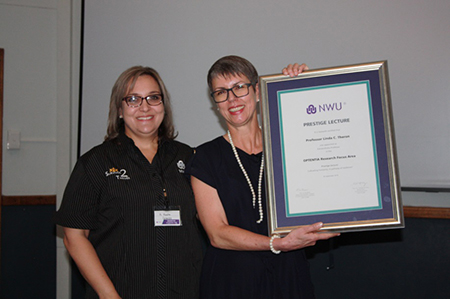These quotes illustrate that caring connections matter for the resilience of South African adolescents facing chronic, unthinkable levels of hardship.
Prof Linda Theron’s research among young people has shown the value of these connections.
Prof Theron recently stepped into her new position as extraordinary professor at the Optentia research focus area on the North-West University’s (NWU’s) campus in Vanderbijlpark.
She describes these caring connections as being broadly inclusive of family, non-family, young and old, all races and abilities.

Prof Ansie Fouché and Prof Linda Theron.
She argued that caring connections that prioritise human solidarity and the wellbeing of adolescents, can be seen as enablers of the resilience in young people. Prof Theron defines these connections as a fundamental loving kindness.
Prof Theron reckons that the findings of international studies done on resilience are similar to what was found in the South African context, with a few significant exceptions.
She explained that when Sesotho or IsiZulu speaking adolescents talk about the inclusive human collective that makes a difference to them when it comes to resilience, it is tough to predict who they will include. It may be a biological parent or someone who is like a parent; it may be a peer or even a kind stranger.
South African studies are also distinguished by local socio-cultural considerations such as interdependence and other local realities.
Her argument is that a young person is therefore not resilient per se, but that resilience is co-facilitated. Young people who show good outcomes despite their circumstances have the support of adults and peers who are pro-socially minded.
Her wish is for people to commit to championing the resilience of young people who are at risk. They can do this by joining hands with them, affirming their strengths and showing them that they are not alone.
She dreams of adults fighting for societies where there is less risk, enabling young people to feel safe and less threatened, and fighting for more meaningful resources such as education.
Prof Theron shared her experience working with young people who are living what she calls “terrible lives”, yet are still determined to keep going. She urged parents, teachers, family and neighbours of such youngsters to work with them to find a way to sustain their resilience.
Prof Theron believes that by purposefully committing to research towards humanity and sustainable human solidarity, we will never lose. We will either win, or we will learn.
